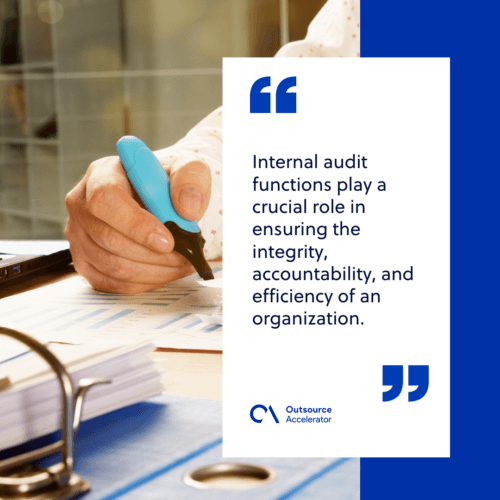The value of offshoring internal audit functions

Offshoring has long been associated with either customer service or IT support. But today, many companies are realizing the untapped potential of offshoring more strategic functions, such as internal auditing.
Offshoring internal audit functions goes beyond being a simple cost-cutting measure. It offers businesses the opportunity to find specialized expertise, operational flexibility, and technological innovation.
But is it the right move for your business? Let’s explore the real value when you offshore internal audit functions.
The significance of internal audit functions in organizations
Internal audit functions play a crucial role in ensuring the integrity, accountability, and efficiency of an organization. Acting as an independent safeguard, internal audits help identify risks, assess internal controls, and ensure compliance with regulatory standards.
They provide valuable insights into the effectiveness of operational processes, financial reporting, and corporate governance.
These roles uncover weaknesses and inefficiencies before they escalate into major issues. Internal audits not only protect the organization from potential legal or financial repercussions but also enhance decision-making by offering a clear picture of the company’s internal workings.
This makes internal audit a vital component for sustainable growth and long-term success.

5 Benefits of offshore internal audit functions
Offshore internal audit functions can offer a range of benefits that support long-term business goals:
1. Cost efficiency and financial benefits
Offshoring internal audit functions can significantly reduce operational costs. By leveraging lower labor costs in offshore locations, companies can achieve substantial savings compared to maintaining an in-house audit team.
This cost efficiency allows organizations to allocate resources to other strategic areas without compromising on the quality of their audit processes.
2. Access to specialized expertise
Offshore locations often provide access to highly skilled audit professionals with specialized knowledge in various industries and regulatory environments.
This expertise can enhance the quality of audits, as offshore teams bring a diverse range of skills and experience.
Companies benefit from cutting-edge practices and insights that might be less accessible domestically.
3. Scalability and flexibility
Offshore internal audit functions offer remarkable scalability and flexibility. Organizations can quickly adjust the size of their audit teams based on fluctuating business needs, such as during peak audit seasons or organizational changes.
This adaptability helps businesses manage their audit requirements efficiently without the overhead of maintaining a large, permanent in-house team.
4. Technological advancements and efficiency gains
Offshore audit providers often utilize the latest audit software and technological tools, which can enhance the efficiency and effectiveness of audit processes.
Advanced technologies such as data analytics and automation can streamline auditing tasks, improve accuracy, and provide deeper insights into organizational performance.
5. Enhanced objectivity and independence
Offshore internal auditors bring an external perspective to the audit process, which can enhance objectivity and reduce biases.
Their independent stance helps provide an unbiased evaluation of internal controls and processes, which can be essential for maintaining the integrity of the audit function.
8 Best practices when you offshore internal audit functions
We recommend following these best practices to maximize the benefits of offshoring internal audit functions:
- Select the right partner – Choose a reputable and experienced provider with a proven ability to handle complex audit tasks.
- Establish communication channels – Set up regular meetings and communication lines to align expectations, requirements, and progress.
- Define scope and objectives – Develop detailed plans to ensure the offshore internal audit team understands the specific requirements and goals.
- Implement data security – Ensure the partner adheres to stringent data protection protocols.
- Evaluate performance regularly – Regularly assess the performance of the offshore internal audit team against established benchmarks and KPIs.
- Foster strong relationships – Build strong working relationships between onshore and offshore teams, promoting a culture of mutual respect and cooperation.
- Ensure compliance – Verify that the offshore internal audit team follows both local regulations and international auditing standards.
- Provide training – Invest in the ongoing training and development of the offshore internal audit team to keep them updated and adaptable.

Find a skilled internal auditor through Offshore MVP
It’s crucial to find a skilled and reliable offshore auditor to achieve success. Offshore MVP stands out as a premier solution for those seeking qualified audit professionals with the expertise to drive excellence in their processes.
With Offshore MVP, companies can access a global talent pool that brings specialized knowledge, advanced skills, and a commitment to quality.
Offshore MVP offers a strategic advantage by connecting businesses with the right talent to achieve their audit goals.
By partnering with Offshore MVP, you can confidently enhance your internal audit functions, streamline operations, and drive organizational success with the support of a skilled offshore audit team.







 Independent
Independent




